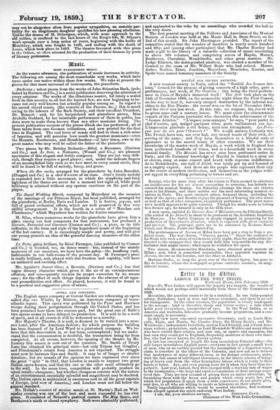trttrr to Or Cahn.
LABOUR IN THE WEST INDIES.
Walbrook Irottee,16th February 1859. Sin—No West Indian will oppose the inquiry you suggest, the results of which would not perhaps differ materially from those of the Committee of 1848.
Meantime, the question seems to lie in a nutshell. In one fully-peopled. colony, Barbadoes, land is dear and labour abundant, and there is no call for immigrants. In the other colonies, the population is totally inadequate to the acreage : land is therefore cheap and labour scarce ; a rule which holds good everywhere, irrespective of race. In the West Indies, as in America and Australia, labourers gradually become proprietors, and a con- stant supply is necessary. In this view have concurred successive Governors, such as Lords Met-
calfe, Elgin, and Harris, Sir Charles Grey, Sir Henry Barkly, and Mr. Wodehouse; independent travellers, such as Lord Stanley, and several Ame- rican writers ; proprietors, such as Lord Howard de Walden and many others who have visited their estates, and sent out, as agents and managers, the best men they could get in England, frequently members of their own fami- lies, who had never known the slavery, system.
In this has concurred at length the long incredulous Colonial office—the
still longer incredulous English press—everyone in fact except a small knot of men, who on no earthly ground but the assumption of a respected name, claim to interfere in the affairs of the Colonies, and now ask us to believe that landowners of many different races, in far distant settlements, unite, with the full assent of intelligent Governors, in the idiotic scheme of bring- ing at heavy cost from the other hemisphere labour which is ready to their hands at home. Aye, and even paying more for it when they have thus im- ported it. Last year, indeed, they were charged with a starving ratio of wages to the immigrants,—the large and rapid accumulation of their savings Eqpt, tired this. They are now accused of giving them an undue advantage, by / furnishing them with the house and garden which every negro has, and which few proprietors (I speak from a wide experience) do not gladly give, rent free, to all who are willing to reside as labourers on their estates.
Verily improbabilities which would be scouted elsewhere, find credence when alleged against the much enduring West Indian.
Chairman of the West India Committee.


























 Previous page
Previous page